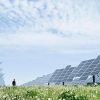Energy source of the future: energy efficiency
Germany has ambitious goals for the energy transition. We present specific projects. The deutschland.de series “Energy Transition”, part 10.

Less is more. Schoolchildren, teachers and school caretakers in Hanover have known this for some time. For 20 years now they have been forming energy teams to hunt down energy leaks in their buildings. They are on the look-out for opportunities to save energy or to use it more efficiently. In this way the 90 schools participating in the project save altogether hundreds of thousands of euros every year. And the children, the energy consumers of tomorrow, bring the subject home with them so that their parents can also learn something.
The initiative in Hanover is one of the winners of the competition “Energy Efficiency in Public Institutions – Good Examples 2013”, which the German Energy Agency (dena) presented at the end of 2013 at its energy efficiency conference in Berlin. Other winners were the Free State of Bavaria for its energy-saving contracting at the Pinakothek of Modern Art, the districts of Göttingen, Northeim and Osterode in northern Germany for the competition “Our Village Saves Electricity” and the city of Löhne in North Rhine-Westphalia for connecting energy-saving renovations at schools with teaching.
They are all pioneers of energy efficiency, which the International Energy Agency’s (IEA) “World Energy Outlook 2013” has called the most important “energy source” of the future. The knowledge that more efficiency is needed for a successful energy transition in Germany has also been set down in the Black-Red coalition agreement, in which the party leaders if the CDU/CSU and the SPD agreed that “The reduction of energy consumption through increased energy efficiency must be a central component of the energy transition and be given more emphasis”. To this end, the first National Energy Efficiency Action Plan is to be drawn up in 2014 and adopted by the federal government.

